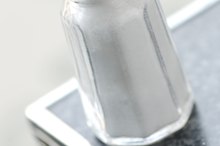What does fact checked mean?
At Healthfully, we strive to deliver objective content that is accurate and up-to-date. Our team periodically reviews articles in order to ensure content quality. The sources cited below consist of evidence from peer-reviewed journals, prominent medical organizations, academic associations, and government data.
The information contained on this site is for informational purposes only, and should not be used as a substitute for the advice of a professional health care provider. Please check with the appropriate physician regarding health questions and concerns. Although we strive to deliver accurate and up-to-date information, no guarantee to that effect is made.
Iodine's Effect on Calcium Absorption
Iodine is a trace mineral naturally present in seaweed, dairy products, seafood and some fruits and vegetables. This essential nutrient can be added to foods in the form of iodized salts and is available as a dietary supplement. All the body’s cells need iodine to work properly. Glands such as the thyroid gland and adrenal glands need iodine to produce and release hormones. However, certain minerals – including calcium – can affect iodine levels in the body.
Calcium Metabolism
One of the many functions of a healthy thyroid gland is to produce a hormone known as calcitonin, which works to lower blood calcium levels. The hormone aids in calcium metabolism by maintaining proper calcium levels in the body preventing the development of either hypocalcemia or hypercalcemia – low or elevated calcium levels in the blood. If left untreated, hypercalcemia can have serious health consequences including abnormal heart rhythm, kidney damage or osteoporosis. Although the body needs calcium for strong bones, this dietary mineral also plays a role in helping the heart, muscles and nervous system to work.
- One of the many functions of a healthy thyroid gland is to produce a hormone known as calcitonin, which works to lower blood calcium levels.
Recommended Dietary Allowances
Foods Rich in Potassium Iodide
Learn More
The recommended dietary allowance for iodine for healthy adults ages 19 and older is 150 mcg daily. Pregnant women need 220 mcg daily – lactating women 290 mcg, according to standards developed by the Institute of Medicine’s Food and Nutrition Board. The calcium requirement for adult men and women between the ages of 19 and 50 is 1,000 mg daily. Women age 51 and older need 1,200 mg. Men older than age 70 need increased calcium intake as well. Talk to your doctor first before taking calcium or iodine supplements 12. Some nutrients interact with each other or with certain types of medications.
- The recommended dietary allowance for iodine for healthy adults ages 19 and older is 150 mcg daily.
- The calcium requirement for adult men and women between the ages of 19 and 50 is 1,000 mg daily.
Goitrogens
Goitrogens are substances that suppress thyroid function by blocking iodine uptake. This action can lead to hypothyroidism or enlargement of the thyroid gland. Calcium, magnesium, fluoride and manganese are minerals that can interfere with the body’s absorption of iodine. Raw vegetables such as:
- cabbage
- broccoli
- kale
- cauliflower
- brussels sprouts
- mustard
- lima beans are some foods in which goitrogens are present
In the case of plant foods, goitrogens usually become inactive when you cook the vegetables.
- Goitrogens are substances that suppress thyroid function by blocking iodine uptake.
Thyroid Medications
Calcium Absorption & Potassium
Learn More
Calcium can interfere with the body’s ability to absorb synthetic thyroid hormones that doctors prescribe to treat hypothyroidism – under active or low thyroid. Take calcium supplements or calcium-fortified juices three or four hours before or after taking thyroid medications 2. Avoid taking thyroid drugs with foods that bind the iodine impairing thyroid function.
- Calcium can interfere with the body’s ability to absorb synthetic thyroid hormones that doctors prescribe to treat hypothyroidism – under active or low thyroid.
- Avoid taking thyroid drugs with foods that bind the iodine impairing thyroid function.
Related Articles
References
- Office of Dietary Supplements: Iodine
- Office of Dietary Supplements: Calcium
- Chronic Neuroimmune Diseases; Thyroid Need-to-Know; Melissa Kaplan; December 2009
- Thyroid-info; Thyroid Drugs; Mary Shomon; August 2011
- American Thyroid Association. Iodine Deficiency. 2020.
- Eastman CJ, Zimmermann MB. The iodine deficiency disorders. In: Feingold KR, Anawalt B, Boyce A, et al., editors. Endotext. South Dartmouth, MA: MDText.com, Inc. Updated February 6, 2018.
- Ahad F, Ganie SA. Iodine, Iodine metabolism and Iodine deficiency disorders revisited. Indian J Endocrinol Metab. 2010;14(1):13-17.
- Kostoglou-athanassiou I, Ntalles K. Hypothyroidism - new aspects of an old disease. Hippokratia. 2010;14(2):82-87.
- American Thyroid Association. Hypothyroidism in Children and Adolescents. 2020.
- National Institutes of Health, Office of Dietary Supplements. Iodine. Updated July 9, 2019.
- U.S. National Library of Medicine. Congenital hypothyroidism. Updated February 11, 2020.
- Johnson LE. Iodine. Merck Manual Professional Version. Updated October 2018.
- Murthy MB, Krishnamurthy B. Severe irritant contact dermatitis induced by povidone iodine solution. Indian J Pharmacol. 2009;41(4):199-200. doi:10.4103/0253-7613.56069
- Puchalski AR, Chopra IJ. Radioiodine treatment of differentiated thyroid cancer despite history of 'iodine allergy'. Endocrinol Diabetes Metab Case Rep. 2014;2014:130084. doi:10.1530/EDM-13-0084
- Schabelman E, Witting M. The relationship of radiocontrast, iodine, and seafood allergies: a medical myth exposed. J Emerg Med. 2010;39(5):701-707. doi:10.1016/j.jemermed.2009.10.014
- National Institutes of Health, Office of Dietary Supplements. Iodine. Updated July 9, 2019.
- American Cancer Society. Radioactive Iodine (Radioiodine) Therapy for Thyroid Cancer. Updated March 14, 2019.
- Centers for Disease Control and Prevention. Potassium iodide (KI). Updated April 4, 2018.
- Kalra S, Unnikrishnan AG, Sahay R. The hypoglycemic side of hypothyroidism. Indian J Endocrinol Metab. 2014;18(1):1-3.doi:+10.4103/2230-8210.126517
Writer Bio
Amber Keefer has more than 25 years of experience working in the fields of human services and health care administration. Writing professionally since 1997, she has written articles covering business and finance, health, fitness, parenting and senior living issues for both print and online publications. Keefer holds a B.A. from Bloomsburg University of Pennsylvania and an M.B.A. in health care management from Baker College.









